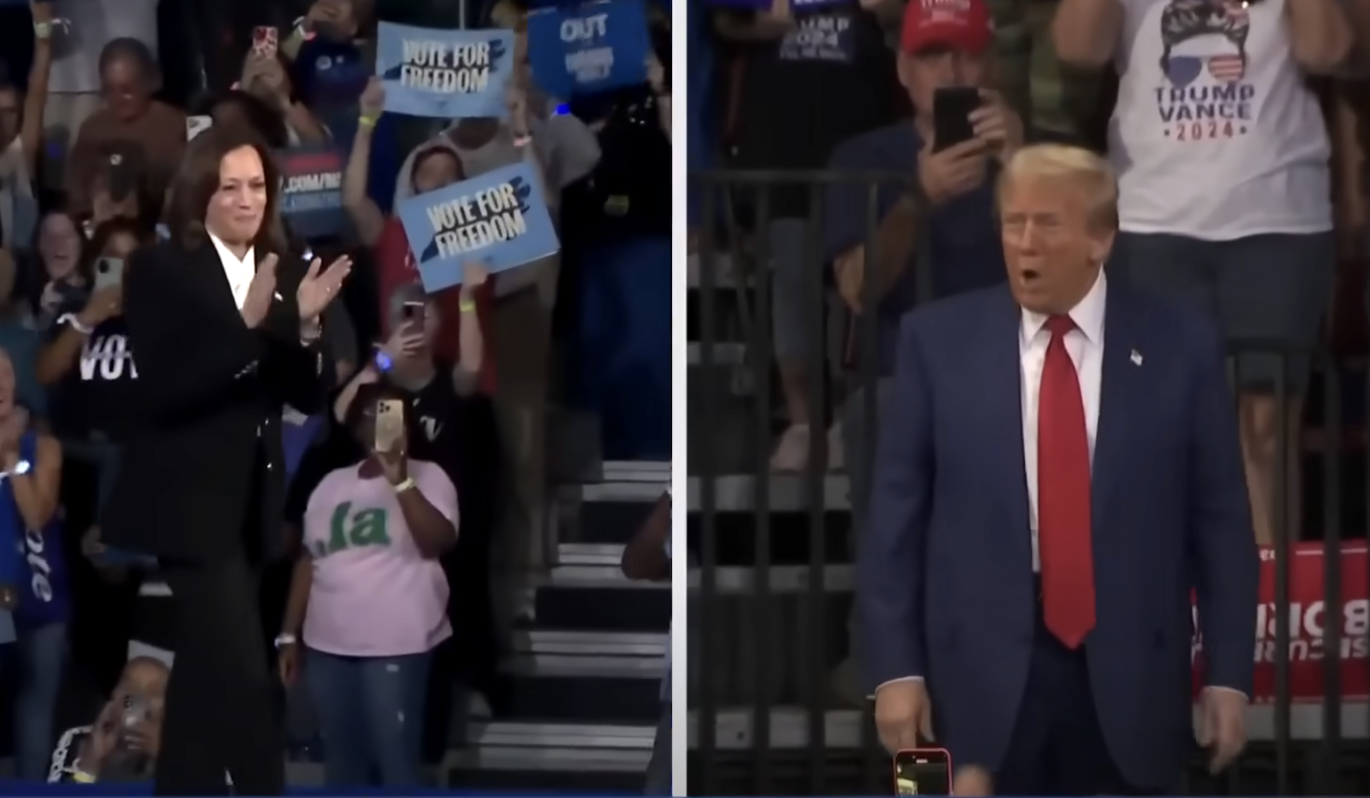2024 Elections
Harris and Trump are Currently Deadlocked in the Polls. Will the Presidential Race Go Down the Wire?

Source: YouTube
As Election Day looms on the horizon, the presidential race between Donald Trump and Kamala Harris has reached fever pitch, with recent polls indicating a contest so close it's sending shockwaves through the political landscape. The latest NBC News poll has revealed a dead heat, showing Trump and Harris tied at 48% each. This represents a dramatic shift from just a month ago when Harris held a comfortable five-point lead. The tightening of the race has intensified campaign efforts and raised the stakes in key battleground states to unprecedented levels.
Other major polling organizations tell a similar story of the presidential race going down the wire. ABC News/Ipsos shows Harris with a razor-thin lead of 50% to 48% among likely voters, down from a six-point advantage last month. CBS News/YouGov paints a slightly more favorable picture for Harris, putting her up 51% to 48%, but this too marks a decrease from a four-point lead in September. These numbers underscore the volatility of the race and suggest that any lead Harris previously enjoyed has all but evaporated in the crucial final weeks of the campaign.
The Shifting Sands of Voter Demographics
Delving deeper into the numbers reveals significant shifts in voter demographics that are reshaping the electoral landscape. Harris is grappling with challenges in solidifying support among key Democratic constituencies, a factor that could prove decisive come Election Day. While she maintains a lead among women across all racial groups, Harris is struggling to connect with male voters, a demographic that could swing the election in Trump's favor if the trend continues. As a result, the presidential race is tighter than ever.
Perhaps more concerning for the Harris campaign is the apparent erosion of support among African American and Hispanic voters, traditionally strong bases for Democratic candidates. New York Times/Siena College polls show Harris with 78% support from Black voters and 56% from Hispanic voters, numbers that fall short of the levels of support seen in recent elections. This unexpected weakness in what should be areas of strength for Harris has prompted increased outreach efforts, including high-profile interventions from party stalwarts like former President Barack Obama.
The Battle for the Heartland: Swing States Take Center Stage
As the presidential race enters its final stretch, both campaigns are laser-focused on the battleground states that could tip the balance. Recent days have seen a flurry of campaign activity in these crucial territories. Harris made a passionate appeal in Greenville, North Carolina, addressing concerns about misinformation and emphasizing the importance of trust in government. Meanwhile, Trump rallied his base in Prescott Valley, Arizona, doubling down on his promise to increase resources for Border Patrol and tighten immigration policies.
These strategic campaign stops highlight the importance of swing states in the electoral map. States like Florida, Pennsylvania, Michigan, and Wisconsin – which have a history of flipping between parties – are receiving unprecedented attention from both campaigns. The outcome in these battlegrounds could well determine who wins the presidential race and takes the oath of office in January.
The Presidential Race Final Countdown: Strategies and Wildcards
With less than a month to go, this presidential race remains highly unpredictable. Both candidates are pulling out all the stops to secure victory, employing a variety of strategies to sway undecided voters and energize their bases. The Harris campaign is leaning heavily on its ground game, mobilizing an army of volunteers for door-to-door canvassing and phone banking efforts. They're also leveraging social media and digital advertising to reach younger voters who may be less engaged with traditional campaign methods.
The Trump campaign, for its part, is relying on the president's ability to dominate news cycles and energize his base through large-scale rallies. These events, while controversial due to ongoing public health concerns, have proven effective in generating enthusiasm among Trump's core supporters. Key factors to watch in the tight presidential race in the coming weeks include the intensity of get-out-the-vote efforts in crucial swing states, the effectiveness of last-minute advertising blitzes, and the potential for October surprises that could shift the dynamics of the race. Both campaigns are also preparing for potential legal challenges in the event of a close or contested outcome, adding another layer of uncertainty to an already volatile situation.
Every Vote Counts
As Election Day approaches, every vote will count in this nail-biting contest. The outcome of this presidential race could have far-reaching implications for the future of American politics and policy, from the composition of the Supreme Court to the direction of foreign policy and everything in between.
In these final weeks, voter engagement and turnout will be critical. How do you think the tightening polls will affect voter participation? Will it motivate more people to cast their ballots, or could it lead to voter fatigue and disengagement? Tell us what you think each candidate should do to blow the presidential race wide open.
